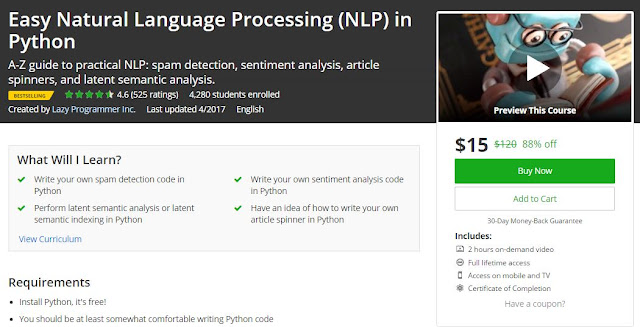What Will I Learn?
- Write your own spam detection code in Python
- Write your own sentiment analysis code in Python
- Perform latent semantic analysis or latent semantic indexing in Python
- Have an idea of how to write your own article spinner in Python
Requirements
- Install Python, it's free!
- You should be at least somewhat comfortable writing Python code
- Install numerical libraries for Python such as Numpy, Scipy, Scikit-learn, Matplotlib, and BeautifulSoup
- Some familiarity with PCA, Markov Models, Logistic Regression
Description
In this course you will build MULTIPLE practical systems using natural language processing, or NLP - the branch of machine learning and data science that deals with text and speech. This course is not part of my deep learning series, so there are no mathematical prerequisites - just straight up coding in Python. All the materials for this course are FREE.
After a brief discussion about what NLP is and what it can do, we will begin building very useful stuff. The first thing we'll build is a spam detector. You likely get very little spam these days, compared to say, the early 2000s, because of systems like these.
Next we'll build a model for sentiment analysis in Python. This is something that allows us to assign a score to a block of text that tells us how positive or negative it is. People have used sentiment analysis on Twitter to predict the stock market.
We'll go over some practical tools and techniques like the NLTK (natural language toolkit) library and latent semantic analysis or LSA.
Finally, we end the course by building an article spinner. This is a very hard problem and even the most popular products out there these days don't get it right. These lectures are designed to just get you started and to give you ideas for how you might improve on them yourself. Once mastered, you can use it as an SEO, or search engine optimization tool. Internet marketers everywhere will love you if you can do this for them!
This course focuses on "how to build and understand", not just "how to use". Anyone can learn to use an API in 15 minutes after reading some documentation. It's not about "remembering facts", it's about "seeing for yourself" via experimentation. It will teach you how to visualize what's happening in the model internally. If you want more than just a superficial look at machine learning models, this course is for you.
NOTES:
All the code for this course can be downloaded from my github: /lazyprogrammer/machine_learning_examples
In the directory: nlp_class
Make sure you always "git pull" so you have the latest version!
HARD PREREQUISITES / KNOWLEDGE YOU ARE ASSUMED TO HAVE:
- calculus
- linear algebra
- probability
- Python coding: if/else, loops, lists, dicts, sets
- Numpy coding: matrix and vector operations, loading a CSV file
- Sci-Kit Learn API
- Some familiarity with PCA, Markov Models, Logistic Regression
TIPS (for getting through the course):
- Watch it at 2x.
- Take handwritten notes. This will drastically increase your ability to retain the information.
- Ask lots of questions on the discussion board. The more the better!
- Realize that most exercises will take you days or weeks to complete.
- Write code yourself, don't just sit there and look at my code.
USEFUL COURSE ORDERING:
- (The Numpy Stack in Python)
- Linear Regression in Python
- Logistic Regression in Python
- (Supervised Machine Learning in Python)
- (Bayesian Machine Learning in Python: A/B Testing)
- Deep Learning in Python
- Practical Deep Learning in Theano and TensorFlow
- (Supervised Machine Learning in Python 2: Ensemble Methods)
- Convolutional Neural Networks in Python
- (Easy NLP)
- (Cluster Analysis and Unsupervised Machine Learning)
- Unsupervised Deep Learning
- (Hidden Markov Models)
- Recurrent Neural Networks in Python
- Natural Language Processing with Deep Learning in Python
Who is the target audience?
- Students who are comfortable writing Python code, using loops, lists, dictionaries, etc.
- Students who want to learn more about machine learning but don't want to do a lot of math
- Professionals who are interested in applying machine learning and NLP to practical problems like spam detection, Internet marketing, and sentiment analysis
About Mustapha
I am online instructor at Udemy. My passions are: Mobile and Web Development, Entrepreneurship and Management. You can read my full biography on My Udemy Page. Feel free to follow me social media to know more about me and the topics and courses I'm teaching.

